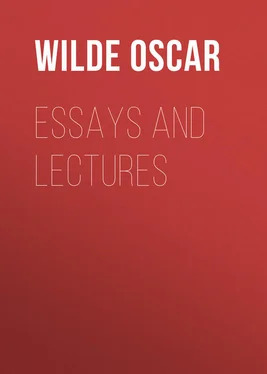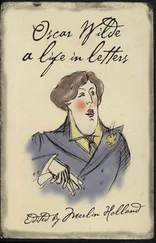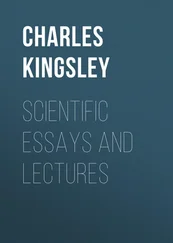Oscar Wilde - Essays and Lectures
Здесь есть возможность читать онлайн «Oscar Wilde - Essays and Lectures» — ознакомительный отрывок электронной книги совершенно бесплатно, а после прочтения отрывка купить полную версию. В некоторых случаях можно слушать аудио, скачать через торрент в формате fb2 и присутствует краткое содержание. Жанр: foreign_home, literature_19, foreign_prose, на английском языке. Описание произведения, (предисловие) а так же отзывы посетителей доступны на портале библиотеки ЛибКат.
- Название:Essays and Lectures
- Автор:
- Жанр:
- Год:неизвестен
- ISBN:нет данных
- Рейтинг книги:3 / 5. Голосов: 1
-
Избранное:Добавить в избранное
- Отзывы:
-
Ваша оценка:
- 60
- 1
- 2
- 3
- 4
- 5
Essays and Lectures: краткое содержание, описание и аннотация
Предлагаем к чтению аннотацию, описание, краткое содержание или предисловие (зависит от того, что написал сам автор книги «Essays and Lectures»). Если вы не нашли необходимую информацию о книге — напишите в комментариях, мы постараемся отыскать её.
Essays and Lectures — читать онлайн ознакомительный отрывок
Ниже представлен текст книги, разбитый по страницам. Система сохранения места последней прочитанной страницы, позволяет с удобством читать онлайн бесплатно книгу «Essays and Lectures», без необходимости каждый раз заново искать на чём Вы остановились. Поставьте закладку, и сможете в любой момент перейти на страницу, на которой закончили чтение.
Интервал:
Закладка:
Now, Aristotle’s theory of the origin of society, like his philosophy of ethics, rests ultimately on the principle of final causes, not in the theological meaning of an aim or tendency imposed from without, but in the scientific sense of function corresponding to organ. ‘Nature maketh no thing in vain’ is the text of Aristotle in this as in other inquiries. Man being the only animal possessed of the power of rational speech is, he asserts, by nature intended to be social, more so than the bee or any other gregarious animal.
He is φύσει πολιτικός , and the national tendency towards higher forms of perfection brings the ‘armed savage who used to sell his wife’ to the free independence of a free state, and to the ἰσότης τοῦ ἄρχειν καὶ τοῦ ἄρχεσθαι , which was the test of true citizenship. The stages passed through by humanity start with the family first as the ultimate unit.
The conglomeration of families forms a village ruled by that patriarchal sway which is the oldest form of government in the world, as is shown by the fact that all men count it to be the constitution of heaven, and the villages are merged into the state, and here the progression stops.
For Aristotle, like all Greek thinkers, found his ideal within the walls of the πόλις , yet perhaps in his remark that a united Greece would rule the world we may discern some anticipation of that ‘federal union of free states into one consolidated empire’ which, more than the πόλις , is to our eyes the ultimately perfect polity.
How far Aristotle was justified in regarding the family as the ultimate unit, with the materials afforded to him by Greek literature, I have already noticed. Besides, Aristotle, I may remark, had he reflected on the meaning of that Athenian law which, while prohibiting marriage with a uterine sister, permitted it with a sister-german, or on the common tradition in Athens that before the time of Cecrops children bore their mothers’ names, or on some of the Spartan regulations, could hardly have failed to see the universality of kinsmanship through women in early days, and the late appearance of monandry. Yet, while he missed this point, in common, it must be acknowledged, with many modern writers, such as Sir Henry Maine, it is essentially as an explorer of inductive instances that we recognise his improvement on Plato. The treatise περὶ πολιτείων , did it remain to us in its entirety, would have been one of the most valuable landmarks in the progress of historical criticism, and the first scientific treatise on the science of comparative politics.
A few fragments still remain to us, in one of which we find Aristotle appealing to the authority of an ancient inscription on the ‘Disk of Iphitus,’ one of the most celebrated Greek antiquities, to corroborate his theory of the Lycurgean revival of the Olympian festival; while his enormous research is evinced in the elaborate explanation he gives of the historical origin of proverbs such as οὐδεῖς μέγας κακὸς ἰχθῦς , of religious songs like the ἰῶμεν ἐς Ἀθήνας of the Botticean virgins, or the praises of love and war.
And, finally, it is to be observed how much wider than Plato’s his theory of the origin of society is. They both rest on a psychological basis, but Aristotle’s recognition of the capacity for progress and the tendency towards a higher life shows how much deeper his knowledge of human nature was.
In imitation of these two philosophers, Polybius gives an account of the origin of society in the opening to his philosophy of history. Somewhat in the spirit of Plato, he imagines that after one of the cyclic deluges which sweep off mankind at stated periods and annihilate all pre-existing civilisation, the few surviving members of humanity coalesce for mutual protection, and, as in the case with ordinary animals, the one most remarkable for physical strength is elected king. In a short time, owing to the workings of sympathy and the desire of approbation, the moral qualities begin to make their appearance, and intellectual instead of bodily excellence becomes the qualification for sovereignty.
Other points, as the rise of law and the like, are dwelt on in a somewhat modern spirit, and although Polybius seems not to have employed the inductive method of research in this question, or rather, I should say, of the hierarchical order of the rational progress of ideas in life, he is not far removed from what the laborious investigations of modern travellers have given us.
And, indeed, as regards the working of the speculative faculty in the creation of history, it is in all respects marvellous how that the most truthful accounts of the passage from barbarism to civilisation in ancient literature come from the works of poets. The elaborate researches of Mr. Tylor and Sir John Lubbock have done little more than verify the theories put forward in the Prometheus Bound and the De Natura Rerum ; yet neither Æschylus nor Lucretias followed in the modern path, but rather attained to truth by a certain almost mystic power of creative imagination, such as we now seek to banish from science as a dangerous power, though to it science seems to owe many of its most splendid generalities. 5 5 Notably, of course, in the case of heat and its laws.
Leaving then the question of the origin of society as treated by the ancients, I shall now turn to the other and the more important question of how far they may he said to have attained to what we call the philosophy of history.
Now at the outset we must note that, while the conceptions of law and order have been universally received as the governing principles of the phenomena of nature in the sphere of physical science, yet their intrusion into the domain of history and the life of man has always been met with a strong opposition, on the ground of the incalculable nature of two great forces acting on human action, a certain causeless spontaneity which men call free will, and the extra-natural interference which they attribute as a constant attribute to God.
Now, that there is a science of the apparently variable phenomena of history is a conception which we have perhaps only recently begun to appreciate; yet, like all other great thoughts, it seems to have come to the Greek mind spontaneously, through a certain splendour of imagination, in the morning tide of their civilisation, before inductive research had armed them with the instruments of verification. For I think it is possible to discern in some of the mystic speculations of the early Greek thinkers that desire to discover what is that ‘invariable existence of which there are variable states,’ and to incorporate it in some one formula of law which may serve to explain the different manifestations of all organic bodies, man included , which is the germ of the philosophy of history; the germ indeed of an idea of which it is not too much to say that on it any kind of historical criticism, worthy of the name, must ultimately rest.
For the very first requisite for any scientific conception of history is the doctrine of uniform sequence: in other words, that certain events having happened, certain other events corresponding to them will happen also; that the past is the key of the future.
Now at the birth of this great conception science, it is true, presided, yet religion it was which at the outset clothed it in its own garb, and familiarised men with it by appealing to their hearts first and then to their intellects; knowing that at the beginning of things it is through the moral nature, and not through the intellectual, that great truths are spread.
So in Herodotus, who may be taken as a representative of the orthodox tone of thought, the idea of the uniform sequence of cause and effect appears under the theological aspect of Nemesis and Providence, which is really the scientific conception of law, only it is viewed from an ethical standpoint.
Читать дальшеИнтервал:
Закладка:
Похожие книги на «Essays and Lectures»
Представляем Вашему вниманию похожие книги на «Essays and Lectures» списком для выбора. Мы отобрали схожую по названию и смыслу литературу в надежде предоставить читателям больше вариантов отыскать новые, интересные, ещё непрочитанные произведения.
Обсуждение, отзывы о книге «Essays and Lectures» и просто собственные мнения читателей. Оставьте ваши комментарии, напишите, что Вы думаете о произведении, его смысле или главных героях. Укажите что конкретно понравилось, а что нет, и почему Вы так считаете.












